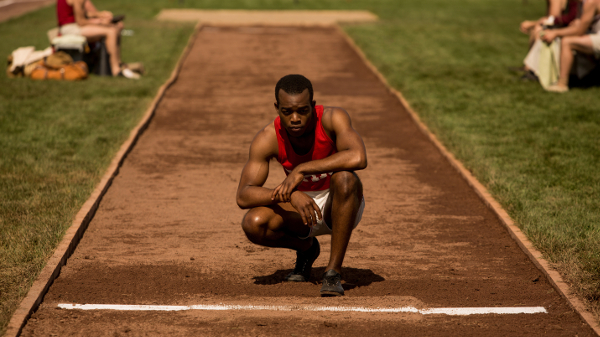
– By Cate Marquis –
“Race” strives but falls short in telling tale of Jesse Owen’s Olympic glory
Olympic great Jesse Owens is a worthy subject for big, splashy Hollywood movie. Owens, an African American had to overcome the hurdles of racial discrimination just to compete in track and field, not only earned a record-breaking four gold medals but had the satisfaction of doing so at the 1936 Berlin Olympics in front of Adolph Hitler, therefore thumbing his nose, metaphorically, at the Nazis’ ideas about Aryan racial superiority. It is a great story, an inspirational story but while Owens’ triumph is ripe for a first-rate film, the crowd-pleasing but modest “Race” is less worthy than its subject.
That is not to say “Race” does not have its good points – it does, starting with its clever title, a good cast, and a willingness to show racism at home as well as abroad – but that real story is larger and more epic than the film that tells it. The film’s flaws are the flaws of most sports movies. Director Stephen Hopkins and writers Joe Shrapnel and Anna Waterhouse deliver a feel-good movie that is definitely a stand-up-and-cheer crowd-pleaser. To the film’s credit, it does not shy away from racism in 1930s America nor Owens’ shoddy treatment in his home country after his great victory, but it does not dwell on them either. It is a serviceable biopic but it is just that Owens’ story had the potential for something more.
However, Stephan James does a fine job portraying Owens, who he plays with a quiet, steady dignity while also radiating a certain personal charm. James’ Owens is a decent, hard-working young man, a dutiful son from a poor family as well as a gifted athlete. Thrilled at earning an athletic scholarship to college, Owens intends to make the most of the opportunity. When he arriving on the Ohio State campus, Owens immediately draws the attention of coach Larry Snyder (Jason Sudeikis ), a one-time Olympic contender now searching for a sprinter with Olympic potential. The coach can see Owens has the talent but is more skeptical whether he has the self-discipline. Owens has no doubts about his work-ethic but shows patience and an even-temper in proving himself to the coach. Two become close, each making the other better as they work towards their common goal.
Casting Sudeikis as the coach seems a risky choice but actually he and James work well together, developing a convincing friendship with an appealing yet subtle comic undercurrent. Shanice Banton adds charm and a little romance playing Owen’s future wife Ruth, which also allows the film to showcase more of his personal side.
The film also stars Jeremy Irons as Avery Brundage and William Hurt as Jeremiah Mahoney, two members of the Olympic committee debating whether the U.S. should boycott the Berlin games. Carice van Houten plays Hilter’s favorite filmmaker, Leni Riefenstahl, who filmed her famous sports documentary/Nazi propaganda film “Olympia” at the 1936 Berlin games, under the sometimes-disapproving eye of Hitler’s Minister of Propaganda Joseph Goebbels, played with a reptilian chill by Barnaby Metschurat.
Owens had to contend with more than the pressures of racism to achieve his goals. The Berlin games were very controversial, and it was hotly debated whether the U.S. should even participate. Once that decision to send Americans was made, Owens faced additional pressure from the NAACP, which urged him not to go, as a show of opposition to Hitler’s policies and ideas. In the end, Owens dominance on the field proved the better rebuke of Hitler’s myth of Aryan superiority.
One of the film’s flaws is that the interactions and dialog often seems too modern, and the film fails to capture a sense of the period, even though it hits the factual milestones. The respect and budding friendship that grows between Owen and his German rival in the broad jump, Carl “Luz” Long (David Kross) seems to happen a little too easily. More objectionable, while “Race” correctly portrays the tension between Goebbels and Riefenstahl, it goes too far in painting director Riefenstahl, a committed Nazi, as somehow expressing tolerance or approval of Owens’ accomplishments, when all the director wanted was a good shot for her film – which celebrated Nazi glory. Historical fact is swept aside in favor of a rosy blush of tolerance that does not accurately reflect the period.
“Race” is not a bad film, and it is still a worth a look for those who unfamiliar with who Jesse Owens was. But Owens’ amazing accomplishments deserve something more. Reportedly, this film is not the only one focusing on Owens set to be released this Olympic year. One has to hope something more epic is on the way.
© Cate Marquis